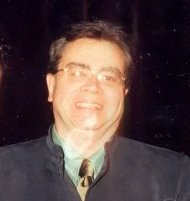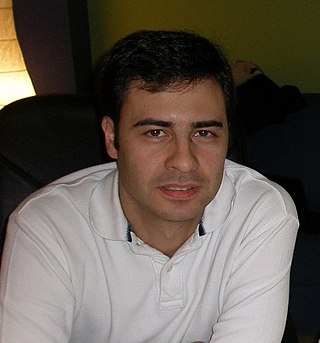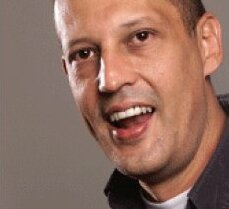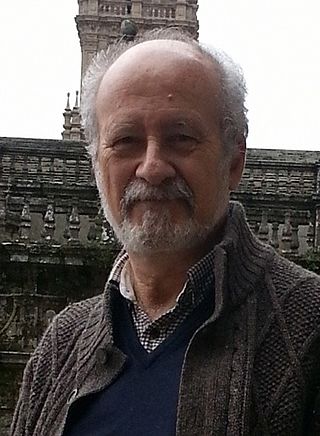Ricardo Teruel | |
|---|---|
| Born | 1956 (age 66–67) Venezuela |
| Genres | Classical |
| Occupation(s) | Composer, and music educator |
| Instrument(s) | Piano |
| Website | rtcompositor |
Ricardo Teruel (born January 1956 in Caracas) is a Venezuelan composer and pianist. [1]
Ricardo Teruel | |
|---|---|
| Born | 1956 (age 66–67) Venezuela |
| Genres | Classical |
| Occupation(s) | Composer, and music educator |
| Instrument(s) | Piano |
| Website | rtcompositor |
Ricardo Teruel (born January 1956 in Caracas) is a Venezuelan composer and pianist. [1]
Teruel worked since 1983 at the Instituto de Fonología of the Centro Simón Bolívar . Since 1988, he is the Director of the Laboratory for Electronic Music. Since 1990 he is a Professor for composition and electronic music at the Instituto Universitario de Estudios Musicales (IUDEM) and teaches at the Conservatorio Simón Bolívar . [1]
This section of a biography of a living person does not include any references or sources .(June 2021) |
Mario Davidovsky was an Argentine-American composer. Born in Argentina, he emigrated in 1960 to the United States, where he lived for the remainder of his life. He is best known for his series of compositions called Synchronisms, which in live performance incorporate both acoustic instruments and electroacoustic sounds played from a tape.
Concertino is the diminutive of concerto, thus literally a small or short concerto.
Ricardo Tacuchian, born in Rio de Janeiro, is a Brazilian conductor, composer and Doctor in Musical Arts (Composition) at the University of Southern California.
Easley R. Blackwood Jr. was an American professor of music, concert pianist, composer, and the author of books on music theory, including his research into the properties of microtonal tunings and traditional harmony.
Tristan Keuris was a Dutch composer.

Tomás Marco Aragón is a Spanish composer and writer on music.
Roberto Sierra is a Puerto Rican composer of contemporary classical music.

José Antônio Rezende de Almeida Prado or Almeida Prado was an important Brazilian composer of classical music and a pianist. On Almeida Prado's death, his personal friend, conductor João Carlos Martins stated that Prado had possibly been the most important Brazilian composer ever.

Alejandro López Román is a Spanish composer and pianist. Musician of eclectic style, his works cover both current symphonic composition like jazz or film music.

Luis Sandi Meneses, was a musician, teacher and composer.

Javier Álvarez Fuentes was a Mexican composer known for compositions that combined a variety of international musical styles and traditions, and that often utilized unusual instruments and new music technologies. Many of his works combine music technology with diverse instruments and influences from around the world. He taught internationally, in the UK and Sweden, and back in Mexico later in his career.
Jiří Gemrot is a Czech composer, radio executive, and a record producer. Since 1990 he has been director in chief of Czech Radio in Prague. As a composer, his music has been performed by all of the Czech Republic's major orchestras.
Marcelo Koc was an Argentinian composer.
Roger John Goeb was an American composer.

José Luis Turina is a Spanish composer, grandson of Joaquín Turina.

Mariano Etkin (1943–2016) was an Argentine composer.
Luis de los Cobos Almaraz was a Spanish composer. In 1944, he was briefly jailed for taking part in protests against the Francoist government, and after he finished his studies in 1949 he couldn't find a job since he lacked the certificate of adherence to the Spanish State, so he went to exile, settling in Geneva after studying orchestral conducting under Bernardo Molinari in Rome and Eugène Bigot in Paris. Like Xavier Montsalvatge and Manuel Castillo he has been defined as a missing link in the postwar Spanish music, as he was influenced by Shostakovichian modernism while the Spanish scene evolved from nationalism to the Darmstadt avantgarde through his contemporaries of the 1951 Generation. He composed four operas, two symphonies, four concertos and six string quartets.

Guido Antonio Santórsola di Bari Bruno was a Brazilian-Uruguayan composer, violinist, violist, viola d'amore player, and conductor of Italian birth.
Aurelio de la Vega was a Cuban-American composer, lecturer, essayist, and poet. He wrote numerous works in many forms and media and, from the early 1960s, was an active force on the United States musical scene. Many of his compositions are published and recorded, and the majority of them are played constantly nationally and internationally. His music and aesthetic ideas have been commented upon and analyzed in books, newspapers and reviews throughout the United States and Latin America. In 1978 he was awarded the coveted Friedheim Award of the Kennedy Center for the Performing Arts, Washington, D.C. and was nominated four times for a Latin Grammy Award.